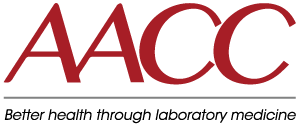Improving Testing Accuracy for Better Health Outcomes
What follows is an interview with AACC staff, including Dominique Smith, Director of Lab Tests Online and eHealth, Molly Polen, Senior Director of Communications & PR, and Vince Stine, Senior Director of Government Affairs.
Why did AACC focus on diagnostic quality improvement and what steps has AACC taken to address diagnostic quality?
AACC is concerned that physicians may inaccurately interpret a test result by applying it to an incorrect reference range.
“A physician could apply the result to the guidance not realizing that the method employed by the lab differs from the one used to develop the guideline,” said Vince Stine. “Harmonizing test results would reduce the possibility of error, while also empowering patients to monitor their care, such as with cholesterol and diabetes.”
Harmonization would result in fewer medical errors, better health outcomes, and reduced costs. In FY18, AACC and 19 other groups joined forces to secure $2 million in funding for the CDC to advance this effort. Each year since then, they have obtained similar amounts, and this year, the Administration is proposing to increase the funds to $7 million.
Additionally, AACC and 29 other groups are working to improve pediatric reference intervals.
“Labs often have to develop their own using samples from sick children,” said Stine. “These intervals are not reflective of a healthy population, which would lead a pediatrician to recommend or not recommend a course of action on imprecise information.”
AACC and its partners is requesting that Congress provide the CDC with funding to collect specimens from healthy children and develop better reference intervals that can be made available to the healthcare community.
What tools or resources you have developed to improve diagnostic processes and safety?
AACC has developed many resources to improve diagnostic quality and safety, especially during the COVID-19 pandemic. Among them are the COVID-19 Resources for Labs and Making Sense of Coronavirus Testing Video Series, the AACC COVID-19 Testing Directory, and COVID-19 testing guidelines.
They have also developed “Optimal Testing: AACC’s Guide to Lab Test Utilization,” focusing on commonly misused tests in hospitals and clinics.
“Improper test utilization can result in poor patient outcomes and waste in the healthcare system,” stated Polen. “This important resource geared toward medical professionals recommends better tests and diagnostic practices.”
What is LabTestsOnline.org and how has it evolved over time?
Lab Tests Online (LTO) is an award-winning health information web resource produced by AACC. LTO launched in 2001 to help patients better understand the many clinical laboratory tests that play a critical role in diagnosing, monitoring, and treating a broad range of conditions, including but not limited to cancer, diabetes, heart disease, autoimmune disorders and infectious diseases.
“At a time when patients have been granted greater access to their personal medical information through electronic health records and lab reports, LTO fulfills a vital need for medical laboratory information that is easy to read and understand,” said Smith. “The site is a go-to reference for questions ranging from why a lab test is ordered to what the results might mean.”
For medical professionals, LTO serves as a quick reference tool or as a resource for keeping up with advances in laboratory science. The information contained on the website can facilitate consultations between healthcare practitioners and the laboratory professionals who provide the lab services. These consultations can help improve diagnosis by ensuring that testing is ordered and interpreted correctly.
LTO helps to improve diagnosis by providing patients with the tools to have more meaningful conversations with their healthcare providers, take a more active role in their health care, and make informed decisions about testing and treatment that could impact their health. LTO also educates patients about their crucial role in the testing process, such as the importance of following test preparation instructions, accurately describing symptoms and medical history, as well as reporting medications that could affect their results.
Initially, LTO started as a pamphlet on screenings that turned into a web resource launched with 100 test descriptions, and over the years became available in 12 languages through 14 country site versions in Asia, Australasia, Europe, North America and South America. It has grown to reach more than 415 Million lifetime visitors across all sites since 2001. AACC has since added new features like Ask a Laboratory Scientist through partnership with ASCLS – patients seeking more information on a test can ask questions that are answered by volunteers from ASCLS’s Consumer Response Service.
Tell us about AACC’s Universal Sample Bank and your new competition to support innovative research in diagnostic testing.
AACC’s Universal Sample Bank offers pre-screened and well-characterized sample sets from over 700 healthy individuals. The sample set can be used in a variety of clinical studies, including clinical assay development, standardization, and reference range studies.
The 2020 AACC Research Prize Competition aims to support AACC members whose innovative research could significantly impact laboratory medicine, patient care, and/or the healthcare system. As part of the competition, up to three winning applicants will receive:
- One AACC Universal Sample Bank set to aid their research. These sets include either serum or lithium heparin plasma samples from more than 700 healthy individuals that are pre-screened and well-characterized.
- The opportunity to present their research at a future AACC Annual Scientific Meeting, the world’s largest gathering for laboratory medicine.
The competition is open to research teams that include at least one AACC member, are affiliated with an academic institution, and whose research supports the advancement of clinical laboratory diagnosis and patient care. The deadline to apply for the 2020 AACC Research Prize Competition is September 15, 2020, at 5 p.m. ET.

Get ACT Update Delivered to Your Inbox
Want to see more content like this? Stay informed on that latest activities from members of the Coalition to Improve Diagnosis. Sign up for the ACT Update Newsletter.
